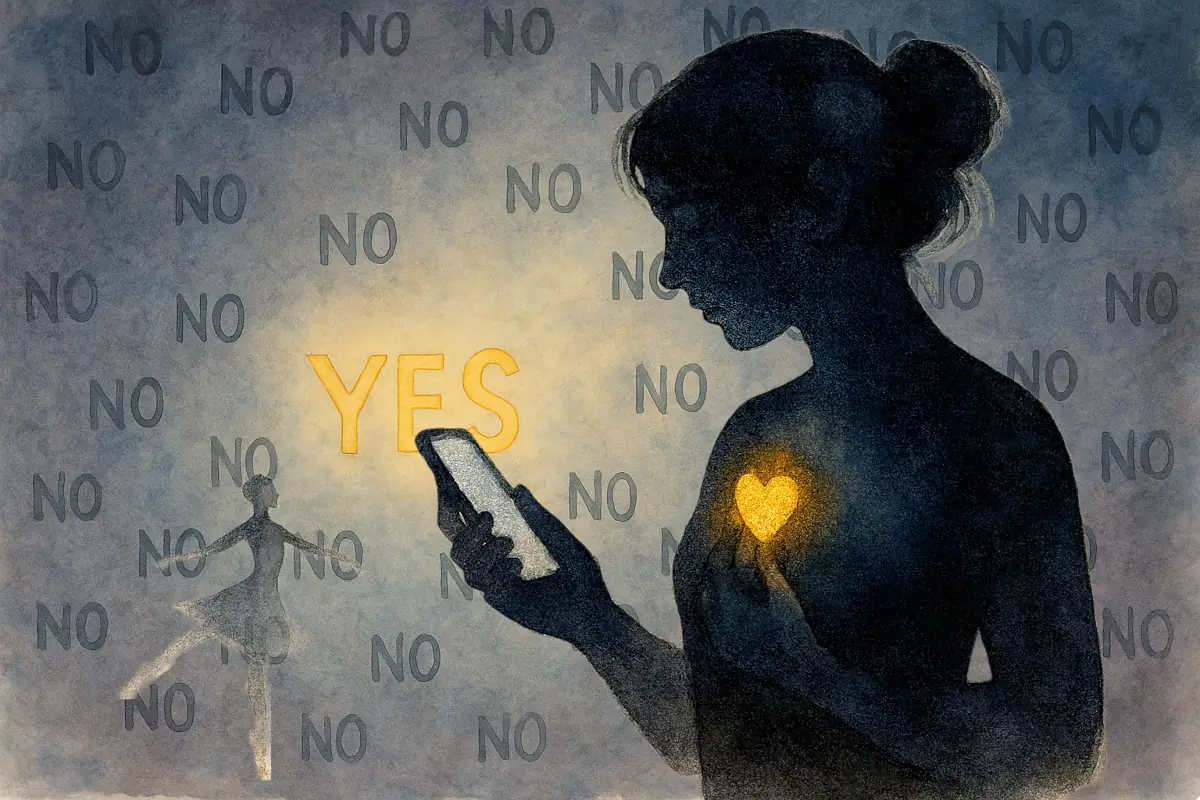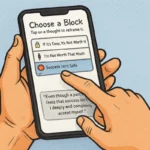The Weight of No: A Dance of Resilience – How EFT Tapping Helps Rewire Rejection’s Sting
The rain had stopped, but the sky still carried the weight of it — a low ceiling of gray pressing against the windows. The air drifting through the cracked pane beside Miriam’s desk smelled faintly of wet asphalt. The hum of her computer was the only sound in the room, exaggerated by the silence.
Her phone screen glowed back at her, the contact name sitting there like a dare. The cursor blinked beside the number, urging her to press call. She’d rehearsed the greeting out loud earlier, catching herself over-enunciating the client’s name so she’d sound confident.
The phone felt heavier than it should. The smooth back warmed quickly in her palm. She’d done the homework: their decision-makers’ names in looping pen strokes on her notepad, each pain point underlined twice. She’d practiced answers to objections, pacing the room while speaking to no one.
Yet her breath caught before the first ring, as if some part of her body had decided this was danger.
It wasn’t just about this one call. She could still remember the last “no” — the clipped politeness in the man’s tone, the pause before “but” that gave the rejection extra weight. She could still hear the softer ones too, the “we’ll think about it” replies that never turned into anything.
Her thumb hovered over the dial. Her pulse thudded in her fingertips. What if they say no? Images rose without invitation: the unread proposal; the inbox with no reply; the subtle drop in tone when her price came up.
She closed her eyes and let the fear surface. Quietly:
“Even though I’m afraid they’ll say no, I honor what I’m feeling and I’m open to finding some ease.”
Her fists curled for the first round — tension in her knuckles — before she let her palms soften for the second. Eyebrow, side of eye, under eye — gentle taps.
Eyebrow: “This fear of hearing no again.”
Side of Eye: “The way it knots in my chest.”
Under Eye: “The memories of all the doors that closed.”
Under Nose: “It still feels personal.”
Chin: “Like they’re rejecting me, not just the offer.”
Collarbone: “Letting my body know I’m safe in this moment.”
Under Arm: “It’s okay to feel this.”
Top of Head: “Releasing just a little of this weight.”
The phone was still in her hand. It didn’t feel lighter, but it didn’t feel impossible.
She pressed call.
The first no of the week came before noon the next day.
It was a clean, efficient rejection — almost rehearsed. “We’ve decided to go with another provider, but thank you for your time.” On the other end, she caught the faint hum of HVAC, the soft click of a keyboard.
She kept her voice steady, ended the call, and sat back. Her eyes fixed on the far wall, where daylight revealed the uneven texture of paint. She let her focus blur until it became nothing. That old thought slid in like an uninvited guest: You’re not good enough for them. You never were.
And then came the memory she’d kept locked away.
Five years earlier.
The boardroom air carried a faint chemical tang from the just-wiped table. She’d been sent to pitch a new service to a row of executives, her blazer stiff at the shoulders, the proposal packets warm in her hands.
Halfway through, the senior VP — tall, with a tie so bright it almost hummed — raised a palm.
“Stop,” he said. The quiet was immediate.
He leaned back, looked her over like he was weighing something invisible, and gave a short, humorless laugh. “You’re not ready for this level of conversation.”
The sentence landed like a dropped stone. He slid her proposal back across the table, its gloss catching the overhead light before stopping inches from her fingers. Another executive kept his gaze down as she gathered her papers.
She’d walked out with her chin up, but her pulse was so loud she barely heard the door shut.
Back in the present, the echo of that voice made her chest tighten. She pressed her palms to her knees, grounding herself against the fabric of her trousers.
“Even though part of me still believes that old story — that I’m not ready, that I don’t belong — I’m open to letting that go.”
Eyebrow: “This old voice in my head.”
Side of Eye: “It’s been with me a long time.”
Under Eye: “It still feels real sometimes.”
Under Nose: “Like I’m back in that room again.”
Chin: “Hearing him say I’m not ready.”
Collarbone: “But that was his story, not mine.”
Under Arm: “I’ve done the work since then.”
Top of Head: “It’s safe to step in now.”
By Friday, there were two more rejections and three ignored proposals. The ignored ones were worse — not even a door slamming, just the quiet absence of acknowledgment. She pictured her emails disappearing before the first line was read.
Her fingers found the side of her hand beneath the desk — the karate chop point — pressing firmly so no one could see. Her lips barely moved:
“Even though their silence cuts deepest, I’m still here.”
At lunch with friends, the table was noisy with talk of promotions, new accounts, and trips paid for by happy clients. Miriam’s fork scraped the edge of her plate as she listened. When she admitted she’d had “a few passes this week,” one friend reached for the bread basket without looking at her. Another smiled briefly, but the conversation veered toward a weekend getaway someone had booked. No one asked what happened.
She lowered her gaze, pressing two fingers lightly to her collarbone — a discreet, public round.
That night, the house was quiet except for the low hum of the refrigerator. Miriam sat in the living room, the laptop’s glow falling over the stack of unpaid invoices beside it. She tapped at the calculator app, running numbers again. They came out the same.
It wasn’t just the money. It was the slow eroding of something she used to trust in herself. Each “no” left a scrape, and the surface was wearing thin.
The next week, a meeting she’d prepared for unraveled in less than ten minutes. She’d been chasing the client for months, arriving ten minutes early, smoothing her skirt while she waited. Across the table, the man scanned her proposal with the idle attention of someone scrolling a feed.
When she finished, he smiled politely. “We’re not interested in pursuing this direction.”
No questions. No counterpoints. Just an ending.
By the time she reached her car, her shoulders were solid knots.
That evening, her husband leaned in the doorway of her office. “Maybe we should think about adjustments,” he said gently. The subtext hung between them: You’re exhausted. I’m worried.
She closed her eyes and pictured her imagined boardroom — sunlight on polished wood, high-backed chairs. She took the seat at the head as her Inner CEO. That version of her didn’t flinch at one person’s decision.
“They didn’t want the offer. That’s all this means. We keep going.”
“Even though part of me feels like this is proof I’m failing, I know my worth isn’t up for debate.”
Eyebrow: “This sting in my chest.”
Side of Eye: “It’s tempting to make it mean too much.”
Under Eye: “Like it says something about who I am.”
Under Nose: “But maybe it doesn’t.”
Chin: “Maybe it’s just one person’s choice.”
Collarbone: “I can separate the outcome from my value.”
Under Arm: “My worth isn’t on trial here.”
Top of Head: “I can keep leading forward.”
The shift came in inches.
A small “yes” from a client she’d nearly given up on. The budget wouldn’t change her finances, but when the contract came through, she felt relief without desperation.
The “no’s” still came, but they didn’t cut the same way. They were hands on her shoulder, turning her toward the next door.
Claire’s words came back to her: “Sometimes you’re pulled close, sometimes you’re spun away. Either way, you’re still on the floor.”
Before her next call, she tapped:
“Even though I’m nervous they’ll turn me away, I’m willing to show up fully and let the steps lead where they lead.”
Eyebrow: “The uncertainty of this dance.”
Side of Eye: “Not knowing if we’ll step together or apart.”
Under Eye: “Wanting it to go my way.”
Under Nose: “But trusting the rhythm has more than one turn.”
Chin: “Letting my body stay steady in the movement.”
Collarbone: “I can follow the beat.”
Under Arm: “I can find my balance.”
Top of Head: “Ready for this step.”
When the yes came, it wasn’t life-changing. It didn’t need to be. It was proof she could keep showing up without being gutted by the outcome.
That evening, she was in the kitchen, slicing vegetables for dinner when her husband walked in.
“You’re humming,” he said, almost surprised.
She hadn’t realized she was.
“How was your day?”
Two no’s, one unanswered call. But none of them felt heavy.
“Good,” she said. And meant it.
He stepped forward, kissed the top of her head, and began setting the table. The knife in her hand glided through the tomato, its seeds spilling like tiny victories. Through the window, the first stars pierced the fading gray. The air smelled of basil and the evening’s damp promise.



